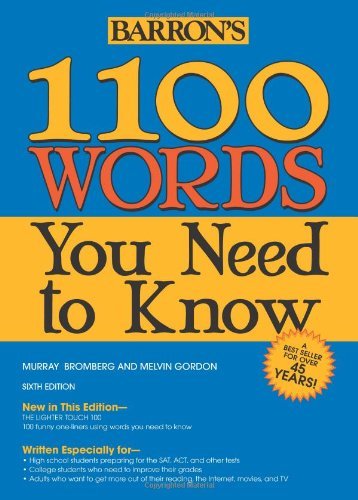Free download.
Book file PDF easily for everyone and every device.
You can download and read online Know What? 100 Things to Know in 1000 Words file PDF Book only if you are registered here.
And also you can download or read online all Book PDF file that related with Know What? 100 Things to Know in 1000 Words book.
Happy reading Know What? 100 Things to Know in 1000 Words Bookeveryone.
Download file Free Book PDF Know What? 100 Things to Know in 1000 Words at Complete PDF Library.
This Book have some digital formats such us :paperbook, ebook, kindle, epub, fb2 and another formats.
Here is The CompletePDF Book Library.
It's free to register here to get Book file PDF Know What? 100 Things to Know in 1000 Words Pocket Guide.
Dec 19, - See how you measure up to this list of intermediate to . This lovely word is used to describe things that resemble or relate to twilight.
Table of contents
What Should We Watch in Korea?
Absolute Beginner S1. Learn how to express your intentions. You've finished everything on your pathway. Add a new path? Study Now.
Lessons Advanced Lesson Search. Dictionary View All Dictionary Results.
Italian Core 100 Word List
Remember my login. Sign In. Start Your Free Trial. Join Now Or sign up using Facebook. View Slideshow. Korean Core Word List. Maenyeon jeoneun naireul meoksseumnida. Eoje swieotsseumnida. Seutobwochie osibpal choga namassseumnida. No I don't. Like tabemasu , you can combine it with another food word. Sushi tabemasen , in the right context, would mean "I do not eat sushi.
Be warned, a lot of Japanese people think fish is not meat… and it seems like almost everything has fish. Mizu nomimasu. There will be plenty of choices. Convenience Store food in Japan is pretty awesome. You could eat at convenience stores for breakfast, lunch, and dinner for a week and always find something new and delicious.
You say this before you're about to eat, to kind of give thanks for the food you're about to devour. But, there isn't really a good one. You say this after you eat, to say thanks for the food. Verbs will get you a long ways. You don't have to know much else as long as you know verbs, because verbs help you to get things done. Even if you don't know the grammatical particles that go with the verbs, you can still communicate.
Will you come back to this hotel to pay your bill?

It can be used with anything. Stick it on a noun for all I care, people will understand. That means "do tennis" or "I do tennis. I'll machimasu. That's a stop sign. I want atarashii clothes. You're okay, so you can say " daijoubu! Listen for it in cool sightseeing spots. All the cool kids are saying it. In fact, everyone is saying it. Ookii should work.
Search form
Is he a good person? No, he's warui. This word is a little bit flexible. Because there are a lot of good things in Japan.
The 17 words you need to know to count in Thai
You'll be able to use this word a lot! Japanese rollercoasters are really tanoshii , by the way. If it's humid, you can say mushi atsui.
- Popular Posts;
- 1,000 Most Common Spanish words = 88% of comprehension.
- Korean Core 100 Word List.
- How many words do you need to know to speak French fluently?.
- 1000 (number);
Just a little tidbit of knowledge that might come in handy. Numbers will be helpful in many situations. There are many different counters in Japanese, which are basically different ways to count different things, but basic numbers like these will work in a pinch. Might be missing from building floors. Also, you shouldn't give gifts in sets of four. Son, She go! There are also 2, and 5, yen bills, too.
Someone is going to Japan. What are the most important words they need to know?
Watch Next
I hope this list was helpful for you! As I mentioned before, this is just the tip of the iceberg. It's fun to go through and try to learn individual Japanese words, but you're not learning the meaning behind the meaning. You don't understand why a word is what it is, and to do that you need to study and build up a foundation for your Japanese.
You also need to study the grammar behind the words, too. Greetings, in particular, are riddled with grammar. Learning the sounds of the greetings without learning the mechanics is like going skydiving without a parachute… doesn't make sense. I hope you decide to dig a little deeper in your Japanese! The first step is to learn the phonetic-ish alphabets of Japanese, hiragana and katakana. Good luck!
Tofugu Series View All Series. View All Japan.